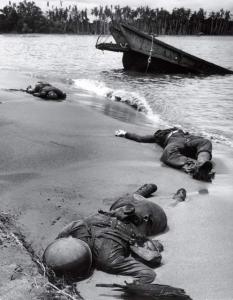Conflicting Realities 2: My Guidance Angel 2
I started a discussion withe the old man last week who took me on a memory lane. We are still talking . And they are quite revealing. Mind to share with me?
Conflicting Realities 2: My Guidance Angel 2
by DavidBokoloAs I looked up, I saw the old man looking away to the far southern end of the river where the mangrove trees drew a thick pattern as a well cultured flowering garden. There is another river coming out at that point to join the main artery which tapered off into the far end as it curve off to form another stretch.
I followed his gaze and noticed that the sun has gone under a very thick grey cloud casting a deep reddish appearance over the river in the western horizon. I looked up to the east, as if on cue, and saw the water blending off into the tall mangrove, curving into the left, going far away into the hinterlands.
From that end, I could notice the eastern horizon bearing the night as a sheet of dark velvet curtain, spreading over a static earth.
“War is an ominous evil that mankind has invented to solve frail egos and acquire position and authority, which left in its wake despicable destruction of the divine order,” he said breaking the silence. “Whenever I hear the sound and drums of war being played, as is the case now, I sympathize with man. They will not ever learn. You cannot settle your differences by trying to kill you opponent.
“War takes away the peace of man and visits him with pain and sorrow, grief and destruction beyond his imagination. In the frenzy atmosphere of the sound of the battle drums, and war cries, only very negligible voices will be crying caution; which will easily be gotten swallowed up in the strident sound of the drums.
“Even now, as I said earlier, I could hear the sound of the drums of war in the distance, and rapidly getting louder,” he finished off with that far away look, seeing into time beyond our realm, I guessed.
“Sir, there has always been war fought in one part of the world or the other. Which one are you referring to here? There is already a war in Nigeria. Isn’t there?” I asked.
“There is a war being fought now which you hear on the News wave. It is still been considered a distant tale from a fairy land. For those that have not experience war first hand, it sounds like an adventure that one could pursue.
“But what they failed to realize is that only few do come back to tell tales of their experience, and even those lives a nightmarish life for a considerable part of their remaining life. War bears in its wings tales that cannot be told by an observer.”
He looked at me sullenly with a suppressed grin, and patted my shoulder. “You had a childhood experience of your old war.”
“Yes I do,” I agreed, my thoughts going back to the first soldier I ever saw in my life. A fat-bellied man, wielding a long rifle; he appeared from the corner of a building, looking grim and threatening. I have gone with my mother to Akpede market in the heat of the war to sell fish on a particular market day.
This fat soldier also came to the market with some of his colleagues to buy things. When I saw him, I exclaimed at his appearance. My mother had to slap my mouth shut with the back of her left hand.
Over the years, I kept on imagining the enterprising spirit of the people in those dire days of war. The people from the riverine areas will bring goods like fish, salt, and other marine based products to this border market to’ exchange’ for food and other product. Exchange it was because most of the trade was done by batter system as the currency of exchange was not accepted as a legal tender across both side of the border.
That was long before the soldiers started coming into our villages and fishing camps, burning and destroying everything.
“Though you had a Childhood experience of the war,” he said to me patiently, “your experience could not be compared to those who lived in the epicenter of the war. For out there, it was a living hell,” he concluded, looking at me.
Though I was a little boy then, probably not more than eight years old, there were some incidents that I could still recall and shudder at the remembrance.
“Do you know that this camp is called Ikirika-kiri,” I asked him. “A name I think it derived on account of it being used in those days as a settlement for some people from Okrika; a tribe of Ijaw people that lived in the eastern part of the Niger Delta.
“Across this river over there,” I pointed across the river to where the little canoe with the two persons had come out. “There is a river there. If you look very well, you can see the entrance from here.”
“I am seeing it,” he answered. “I think it is called Sibokubu-bio. It leads to St. Barbara River, coming out at the confluence of juju-point.”
“You are right,” I agreed, looking at him, wondering how he knows about all these things, but continued instead. “Alright, down that St, Barbara River is the estuary to the Atlantic ocean. There are some fishing camps in the area called Angbakiri, Owukubu, Akananga and others. Angbakiri was some way up from the others.
“As a result of the war, all the fishermen in the camps up in this area have gone south to those settlements to take on any vocation that can sustain a family. Some were producing salt, hewing of the tall mangrove trees as fire wood, and others for the traditional fishing.”
“How were you producing salt in a fishing settlement?” he asked
“Do you want me to explain how we produce salt or you really want to know?” I suckled
“Do you mind telling me that without asking?” he smiled broadly.
“Okay, but that is not what I want to say. I just want to make the point that whether we were at the epicenter of the war or not, we had our fair share of it.” He did not say anything to that, and just stared at me, so I continued.
“It would take one about eight hours of paddling with a canoe to get to Owukubu following the current in an ebbing tide, and passing through Sibokubu-bio. It is also possible for one to just go down- stream from here to get to the estuary of the Atlantic. It will take almost the same time to get there from here.
“It was in the middle of the war and the soldiers have taken over every camp within this area. We were under constant harassment in the village. My father therefore decided to take every member of the family to go to Owukubu to start a salt production business.”
“Did your father know how to produce salt prior to that time?”
“Em...you know that, necessity is the mother of invention. I think there is nobody that has to have a primary school education to know how to start fishing. We all were born here to picking up our net, or hook, a canoe and you have got a certificate to go into fishing. The rest about the technicality, you will learn on the job.”
I looked up at the sky in the far corner up-river. The velvet night curtain was coming very fast covering the earth. The wind blowing in from the sea was quite refreshing, tinting the air with the smell of fresh fish and sludge.
I looked back to the old man and continued. “What was needed for the production of salt at the time of the war was a mere rectangular tin pot measuring about five feet long, three feet in width, and three feet depth. We then prepared a cooking stand with two big mangrove tree logs arranged side by side and make a fire.
“All the raw materials that were needed are the salt water from the river and a steady supply of firewood, which the mangrove forest has an unlimited supply. One can prepare as many pots and fire as he is capable of managing.
“As the water dries up, the salt will be left behind as sediment in the pot. The lager the amount of water one keeps filling the pot with, the larger the quantity of salt produced. On getting the desired amount of salt, it will be emptied into large bamboo woven baskets. The pot will then be filled with fresh water and the salt poured back into it.”
“Why do you need to do that?” He asked.
“The salt water we got from the river carries with it a large quantity of residues.” I explained. “Though, we often collect the water when the river has stopped flowing in full tide or at ebb tide when all the muddy dross has settled into the depth of the river. Some were still got carried with the water to the pot thus given the prepared salt a brownish color.
“The fresh water was therefore used to wash off this brownish appearance to give it a somewhat brighter look.”
“This would be quiet a labour intensive activity.”
“It was. The fire must be on, all day and all night till you have had the desired quantity of salt in the pot and you want to remove it. You’ve got to have a regular supply of firewood to keep the fire burning, and be filling the pot with the salt water. You would have to wake up in the middle of the night to make sure that the fire does not burn out, or the salt burnt black.
“There was also the additional labor of getting the fresh water from another fishing camp across the estuary where there was a bush, every time you need to clean the salt.”
“How do you sell off the product after this rigorous exercise?” he asked.
“There was a total trade blockade into the Eastern part of the country as a result of the war. This resulted into lack of, or shortage of the supply of salt, among other essential marine products. Though the salt we produced was not of the grade of fine refined type, it was able to compensate for the total lack of the product and the resultant health effect on the people.
“We will then packaged the salt into the baskets which we would take to the border market at Akpede for sale.” I concluded
“How’s that possible? After producing the salt, do you have to shut down production until after you have done the sale then you go back and start another round of cooking?” He was looking at me inquiringly.
“You are only asking me to say how this is possible or do you truly want to know?” I asked with a smile.
“Well, you have been explaining the process, and I truly want to know how you concluded this salt production business at a time of strife.”
“While the men and the children are involved in the direct of working at the camp, the wives would take the finished product to the market. It was also a period when various trading activities were also going on.
“Some traders were coming from the hinterlands to buy salt and other marine products to go and sell at the market; they also brought food items and other things to sell in the camps.
“Though, I would want to accept your assessment to an extent that we may not be directly in the epicenter of the war to have a severe effect, we non-the-less, felt it in different ways. We exploited the situation to stay alive. Our life patterns were also greatly displayed.”
“If you have been listening to me since I came here, you would realize that is what I have been saying,” he looked at me, and now I can see the shade of weariness in his face quite plain. “War is a dangerous adventure for anybody, people or nation to undertake. Even now, I can hear the sound and drums of war very loud and clear all over the world.
“It is not the sound that you hear from a distance land and would want to dismiss as tales by moonlight. I can hear it even in your country. The general meetings and assemblies of the world organs are not meetings on global development, but about alignment, about wars, and about production of weapon of wars of destruction of the human race
“Are you paying attention to the news of the world? There is an alarming trend of events tilting into war. I am afraid your nation and the world is in the periphery of a catastrophic cauldron. And with advancement of technology, the wars in the last century will be mere flake compared with what you will have in your hand.”
I could feel his eyes piecing into my heart as he was talking , his voice droning like a giant bird in the distance drawing my mind into a picture sometime in the past. I can see the flashing lights in the night like a dozen touch lights.
“What’s happening?” His voice cut into my thoughts. “Why are you looking as if you’ve seen a ghost?”
“I was just thinking what we suffered during the war,” I looked at him as he raised his eyes inquiringly at me.
“We left the village at dusk to travel to Owukubu on our salt production business. We were two canoes comprising the whole members of the family and some workmen of my father. He had mapped out the route we were to take as to fit with the flow of the current. His estimation was to take us to this camp at about the time when the water was to flow downstream.
“That would have given us a smooth ride down Sibokubu-bio to Juju point, then follow the current down the St. Barbara River to the estuary at Owukubu and we would be home and dry. We would come out from that river, are you seeing that entrance up river from here?” I pointed to the river that comes out from the mid section before the main river curves to the left. “That point is called Okonikiri – named after a certain man that set up a fishing camp at the point.”
From the fading light of evening in the distance, I could see two or three canoes returning to camp. I looked at the old man. He was also staring at them.
More from DavidBokolo
The Weightless Weight
by DavidBokolo
Some times we got weight down by thoughts and imagination that do not have weight. the sooner we realize that, we'll be up and going. So says the old man
- Aug, 3 2015
- Lyric
"You Ripped my Love Into Shreds"
by DavidBokolo
Too much love of the cat, they say, kills the moth. Most love relationship got broken as a result of wrongly managed petty frail nerves. Like as I love to say, just musing.
- Sep, 11 2015
- Free Verse
Sing Me Another Love Song My Love
by DavidBokolo
I held on to my Love and refused to let Him go even when I feel him slipping away
- Sep, 15 2015
- Free Verse Lyric
"And Yet The battle Rages On"
by DavidBokolo
There are many unsung Heroes whose heroism is lost in time and space
- Sep, 23 2015
- Prose
I Wish I Could Rewind The Time
by DavidBokolo
I wish I had Known Him many years ago, It,s not too late now though, but I wish I could rewind the time
The One Who Bears My Burden
by DavidBokolo
In sequel to a previous poem, 'Sweet Memories Lingers', Good always sail over our pains if we take time to ponder.
- Aug, 27 2015
- Prose








5 COMMENTS
Velantra
December 23, 2015 - 19:20 This is beautiful! I can see them sitting there. I see that green land in the picture you had with the Castle. David does this place really exist? My interest in your land is growing so much.DavidBokolo
December 24, 2015 - 17:11 Thanks Velantra for your up-vote and interest you have shown to the people of the Niger Delta. They may give you a chieftaincy title some day.. this place exist in Nigeria and this is the way of life of the peopleVelantra
December 26, 2015 - 12:39 I looked up on the Niger Delta. I didn't even know about the Niger Delta Basin and the oil and natural gas that are produced there. I found some things about how the basin was formed. and all the different clans. It seem your surname must mean from where you are? Do you also speak; ijay (not sure the name anymore). It is very interesting, especially how the basin was formed. there is a beautiful picture of it from space on the internet. I hope you had a Merry Christmas.DavidBokolo
December 26, 2015 - 14:06 I didn't know you are a scholar. You are right about your search, and the history of the people. The common language is Ijaw, but we have different dialects. Have a merry Xmas, V.pies11
October 2, 2019 - 14:23 Hello i am miss Brenda i have private discusion with you via at(piesbrenda106@gmail.com)